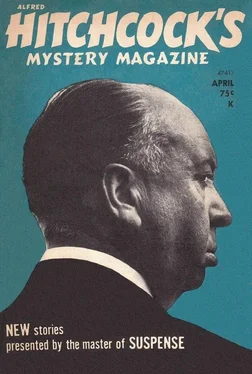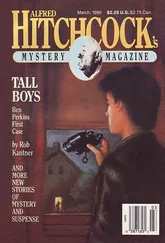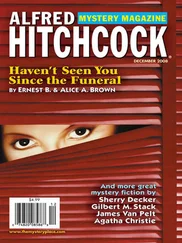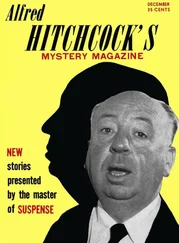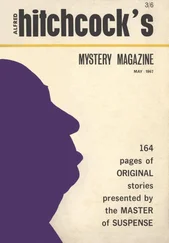Роберт Колби - Alfred Hitchcock’s Mystery Magazine. Vol. 17, No. 4, April 1972
Здесь есть возможность читать онлайн «Роберт Колби - Alfred Hitchcock’s Mystery Magazine. Vol. 17, No. 4, April 1972» весь текст электронной книги совершенно бесплатно (целиком полную версию без сокращений). В некоторых случаях можно слушать аудио, скачать через торрент в формате fb2 и присутствует краткое содержание. Город: Riviera Beach, FL, Год выпуска: 1972, Издательство: H.S.D. Publications, Жанр: Детектив, на английском языке. Описание произведения, (предисловие) а так же отзывы посетителей доступны на портале библиотеки ЛибКат.
- Название:Alfred Hitchcock’s Mystery Magazine. Vol. 17, No. 4, April 1972
- Автор:
- Издательство:H.S.D. Publications
- Жанр:
- Год:1972
- Город:Riviera Beach, FL
- ISBN:нет данных
- Рейтинг книги:5 / 5. Голосов: 1
-
Избранное:Добавить в избранное
- Отзывы:
-
Ваша оценка:
- 100
- 1
- 2
- 3
- 4
- 5
Alfred Hitchcock’s Mystery Magazine. Vol. 17, No. 4, April 1972: краткое содержание, описание и аннотация
Предлагаем к чтению аннотацию, описание, краткое содержание или предисловие (зависит от того, что написал сам автор книги «Alfred Hitchcock’s Mystery Magazine. Vol. 17, No. 4, April 1972»). Если вы не нашли необходимую информацию о книге — напишите в комментариях, мы постараемся отыскать её.
Alfred Hitchcock’s Mystery Magazine. Vol. 17, No. 4, April 1972 — читать онлайн бесплатно полную книгу (весь текст) целиком
Ниже представлен текст книги, разбитый по страницам. Система сохранения места последней прочитанной страницы, позволяет с удобством читать онлайн бесплатно книгу «Alfred Hitchcock’s Mystery Magazine. Vol. 17, No. 4, April 1972», без необходимости каждый раз заново искать на чём Вы остановились. Поставьте закладку, и сможете в любой момент перейти на страницу, на которой закончили чтение.
Интервал:
Закладка:
When they got to the jail, a crowd had already gathered. Miles parked directly in front of the entrance. He unlocked the leg irons and helped Dall out of the car. Commissioner Haley hurried down the jail steps to meet him and together they led the prisoner through the crowd and inside.
After Dall was locked up, Miles lay down in an adjoining cell while young Dr. White, old Doc Scott’s assistant, cleaned and dressed his wound and gave him a tetanus booster to forestall infection.
Miles handed Haley the chrome revolver. “Old Doc Scott’s gun,” he said. “Dall must have taken it from the house after the killing. He had this stuff, too—” He scooped the money and jewelry out of his shirt pocket. “I doubt if there’ll be any of his prints in the house; he had a pair of Doc’s gardening gloves on when I caught him; probably picked them up outside before he went in. They’re on the seat of the car.”
Someone had come in while Miles was talking. He looked back and saw that it was the reporter who had been at the Scott residence earlier.
“Why didn’t you shoot him, Sheriff?” the reporter asked. “You had every right to.”
“He’s a sick man,” Miles said. “He’s not responsible. I didn’t want to shoot him unless I had to. As it turned out, I didn’t have to.”
“He sure came close to getting you,” the reporter remarked, looking at the sheriff’s bandaged arm. “You took a big chance.”
“That’s what the job’s all about,” Miles said. “That’s what the people elected me for — and that’s what I’ll go on doing until they elect somebody else.”
“I don’t think they’ll be electing anyone else for a while,” Commissioner Haley said. “You not only kept the county safe, but you captured the city’s killer for them. I’ll see to it that you get the county commission’s endorsement for reelection, and after this story gets out, you’ll get the people’s vote also.”
“I’ll second that,” the reporter said.
“Nice of you both to say so,” Miles said. “I hope you’re right.” He stood up, turning to Dr. White. “How’s old Doc Scott?”
“Broken up,” the young doctor said. “But it’s the second time around for him, as you know, and he’s seen a lot of dying over the years. He’ll be all right.”
“Sure,” Miles said. He pursed his lips in thought for a moment, then said, “Are they over at Haskell’s Funeral Home yet?”
Dr. White nodded affirmatively.
“I think I’ll walk over for a minute,” Miles told them.
They let him go without objecting. Miles left by the back door and walked down the alley. Haskell’s was at the end of the block. He avoided a small crowd there by using the ambulance entrance. One of the undertaker’s assistants led him to a preparation room where old Doc Scott sat alone by the wall. On a portable table in the center of the room, under a sheet, lay the body of old Doc Scott’s wife.
Miles walked over and lifted the sheet a few inches. Old doc’s young wife was as beautiful in death as she had been in life. Her red hair was spread out over her shoulders the way Miles had always liked it. The bruises on her neck where Miles had strangled her were barely visible. Miles was glad he had done it quickly so that she hadn’t suffered. Of course, he’d had to do it quickly; between the time he’d captured Dall and the time he got back to his office where Commissioner Haley was waiting for him, only a few minutes had elapsed. He hadn’t even had time to say anything to her — not that she would have understood him, drunk as she was.
Miles sighed and lowered the sheet back over her face. Well, he thought, he didn’t have to worry about Gloria anymore.
Or the election either, for that matter.
Survival Tactics
by Leo P. Kelley
The wants of one may take care of the problems of others — and most economically.
The huge lizard stared up at Krenden with its round red eyes from beneath the wild tropical bush, its leathery tail twitching nervously. Krenden, salivating, crouched down and held out his hand as if in welcome while he made what he hoped was a coaxing sound by pursing his lips and sucking in his breath.
The lizard took a ponderous step toward Krenden, and then another, which almost brought its nose into contact with the staves of the stockade that imprisoned Krenden in the center of the aboriginal tribe’s equatorial village. Krenden raised the stone in his hand, reaching through the space between two staves, and brought it down.
The lizard thrashed about for a moment and then lay still. Krenden called out to the native guard outside the stockade, but the brown man, who was wearing only a bark loincloth and paint made from berry juice, ignored him. Krenden tried again, speaking this time in the native’s own language. Wouldn’t the man push the lizard just a little bit closer to the stockade? The thing had thrashed itself out of reach, couldn’t he see? The native stared impassively at the sky. Krenden gritted his teeth. He tied two twigs together with a piece of torn vine he found on the dirt floor of the stockade and, using the shaft he had made, at last managed to drag the carcass into his compound.
He bent down and seized the body of the lizard in both trembling hands. Then, performing what was now a familiar ritual, he slammed it against a rock, smashing its small skull. He carried the corpse to the fire he kept burning in the center of his prison despite the devastating heat of the sun. He skinned it expertly with the knife he took from the pile of sticks beside the fire and then spitted it. He added some withered palm tree branches to the fire and slowly turned the spit he had made. He cursed aloud as hot grease flew up to scald his skin in concert with the burning rays of the sun that had turned his naked body almost as brown as those of his captors.
Less than half an hour later, the roasted body of the lizard lay cooling in the only corner of the compound that was mercifully shaded. Krenden proceeded to devour it hungrily, bite by eager bite, spitting out the small bones which fell among the many others of various sizes already littering the ground at his feet, white witnesses to his necessary depredations.
It was then that the natives thrust the man into the stockade with him. Krenden had not had anyone to share his stockade in more than a week and he felt a surge of genuine joy mixed with intense relief as he turned to confront his new companion. He went to where the dazed newcomer, also a white man, sat slumped in the dust, his head cradled in his arms.
“Hello. My name’s Krenden. Yours?”
“Harley,” muttered the man, struggling to his feet and ignoring Krenden’s outstretched hand.
“What’s that?” Krenden asked as the man mumbled something unintelligible.
“I’m getting out,” Harley answered. “I’m getting out of here right now.”
“Don’t!” Krenden yelled, springing forward to seize Harley. As he struggled with the man, Krenden hastily explained that the natives, although they would not kill him themselves because killing was taboo in their primitive religion, would release the cheetahs they kept caged. The cheetahs, Krenden explained, were atheists, one might say. They would not hesitate, in their hunger, to kill.
“I’m sorry,” Krenden apologized, releasing Harley. “But the cheetahs would have—”
“Thanks.” Harley glanced in the direction Krenden was pointing and saw the rows of caged cats. “Thanks,” he repeated quietly.
“Those cheetahs are very much like this tribe’s concept of justice,” Krenden told his companion. He noted that Harley’s fat face had turned pale with what he clearly recognized as undiluted fear.
Читать дальшеИнтервал:
Закладка:
Похожие книги на «Alfred Hitchcock’s Mystery Magazine. Vol. 17, No. 4, April 1972»
Представляем Вашему вниманию похожие книги на «Alfred Hitchcock’s Mystery Magazine. Vol. 17, No. 4, April 1972» списком для выбора. Мы отобрали схожую по названию и смыслу литературу в надежде предоставить читателям больше вариантов отыскать новые, интересные, ещё непрочитанные произведения.
Обсуждение, отзывы о книге «Alfred Hitchcock’s Mystery Magazine. Vol. 17, No. 4, April 1972» и просто собственные мнения читателей. Оставьте ваши комментарии, напишите, что Вы думаете о произведении, его смысле или главных героях. Укажите что конкретно понравилось, а что нет, и почему Вы так считаете.
